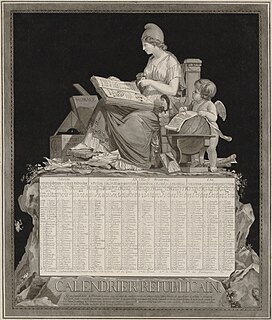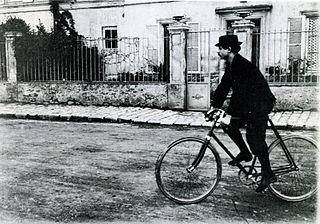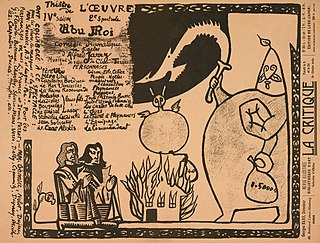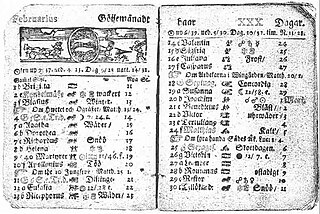
Alfred Jarry was a French symbolist writer who is best known for his play Ubu Roi (1896), a pataphysical work which depicts the bourgeoisie as the super-mediocre. He coined the term and philosophical concept of pataphysics, which uses absurd irony to portray symbolic truths.

The French Republican calendar, also commonly called the French Revolutionary calendar, was a calendar created and implemented during the French Revolution, and used by the French government for about 12 years from late 1793 to 1805, and for 18 days by the Paris Commune in 1871. The revolutionary system was designed in part to remove all religious and royalist influences from the calendar, and was part of a larger attempt at decimalisation in France. It was used in government records in France and other areas under French rule, including Belgium, Luxembourg, and parts of the Netherlands, Germany, Switzerland, Malta, and Italy.
A leap year is a calendar year that contains an additional day added to keep the calendar year synchronized with the astronomical year or seasonal year. Because astronomical events and seasons do not repeat in a whole number of days, calendars that have a constant number of days in each year will unavoidably drift over time with respect to the event that the year is supposed to track, such as seasons. By inserting an additional day or month into some years, the drift between a civilization's dating system and the physical properties of the solar system can be corrected. A year that is not a leap year is a common year.
A month is a unit of time, used with calendars, that is approximately as long as a natural orbital period of the Moon; the words month and Moon are cognates. The traditional concept arose with the cycle of Moon phases; such lunar months ("lunations") are synodic months and last approximately 29.53 days. From excavated tally sticks, researchers have deduced that people counted days in relation to the Moon's phases as early as the Paleolithic age. Synodic months, based on the Moon's orbital period with respect to the Earth-Sun line, are still the basis of many calendars today, and are used to divide the year.

The liturgical year, also known as the church year or Christian year, as well as the kalendar, consists of the cycle of liturgical seasons in Christian churches that determines when feast days, including celebrations of saints, are to be observed, and which portions of Scripture are to be read either in an annual cycle or in a cycle of several years.

'Pataphysics is a difficult-to-define "philosophy" of science invented by French writer Alfred Jarry (1873–1907) intended to be a parody of science.
The Thai lunar calendar, or Tai calendar, is a lunisolar Buddhist calendar. It is used for calculating lunar-regulated holy days. Based on the SuriyaYatra, with likely influence from the traditional Hindu Surya Siddhanta, it has its own unique structure that does not require the Surya Siddhanta to calculate. Lunisolar calendars combine lunar and solar calendars for a nominal year of 12 months. An extra day or an extra 30-day month is intercalated at irregular intervals.

Ubu Roi is a play by French writer Alfred Jarry, then 23 years old. It was first performed in Paris on December 10, 1896, by Aurélien Lugné-Poe's Théâtre de l'Œuvre at Nouveau-Théâtre, 15, rue Blanche, in the 9th arrondissement. The play—scheduled for an invited "industry" run-through, followed by a single public performance the next night—caused a riotous response in the audience and denunciatory reviews in the days after. It is considered a wild, bizarre and comic play, significant for the way it overturns cultural rules, norms, and conventions. To some of those who were in the audience on opening night, including W. B. Yeats and the poet and essayist Catulle Mendès, it seemed an event of revolutionary importance, but many were mystified and outraged by the seeming childishness, obscenity, and disrespect of the piece. It is now seen by some to have opened the door for what became known as modernism in the twentieth century. It is a precursor to Dada, Surrealism and the Theatre of the Absurd. It is the first of three stylised burlesques in which Jarry satirises power, greed, and their evil practices—in particular the propensity of the complacent bourgeoisie to abuse the authority engendered by success.

Pere Ubu is an American rock group formed in Cleveland, Ohio, in 1975. Despite a variety of long-term and recurring band members, singer David Thomas is the only constant. They released their debut album The Modern Dance in 1978 and followed with several more LPs before disbanding in 1982. Thomas reformed the group in 1987, continuing to record and tour.
The early Germanic calendars were the regional calendars used among the early Germanic peoples before they adopted the Julian calendar in the Early Middle Ages. The calendars were an element of early Germanic culture.
The Buddhist calendar is a set of lunisolar calendars primarily used in mainland Southeast Asian countries of Cambodia, Laos, Myanmar and Thailand as well as in Sri Lanka and Chinese populations of Malaysia and Singapore for religious or official occasions. While the calendars share a common lineage, they also have minor but important variations such as intercalation schedules, month names and numbering, use of cycles, etc. In Thailand, the name Buddhist Era is a year numbering system shared by the traditional Thai lunisolar calendar and by the Thai solar calendar.

In Christianity, a name day is a tradition in some countries of Europe and the Americas, and Roman Catholic and Eastern Orthodox countries in general. It consists of celebrating a day of the year that is associated with one's given name. The celebration is similar to a birthday.

Amāvásyā is the lunar phase of the No moon in Sanskrit. Indian calendars use 30 lunar phases, called tithi in India. The dark moon tithi is when the Moon is within the 12 degrees of angular distance between the Sun and Moon before conjunction (syzygy). The New Moon tithi is the 12 angular degrees after syzygy. Amāvásyā is often translated as new moon since there is no standard term for the Moon before conjunction in English.
Clinamen is the Latin name Lucretius gave to the unpredictable swerve of atoms, in order to defend the atomistic doctrine of Epicurus. In modern English it has come more generally to mean an inclination or a bias.

The Apostles Fast, also called the Fast of the Holy Apostles, the Fast of Peter and Paul, or sometimes St. Peter's Fast, is a fast observed by Eastern Orthodox, Oriental Orthodox, Eastern Catholic, and Reformed Orthodox Christians. In the Byzantine tradition, the Fast begins on the second Monday after Pentecost, whereas in the Coptic and old Syriac traditions, the Fast begins on the first Monday after Pentecost. It continues until the Feast of Saints Peter and Paul on June 29. Traditionally, its duration varies from eight to forty-two days because of the moveable nature of Pascha (Easter). However, in Eastern Orthodox Churches that follow the Revised Julian calendar, the fast can be as long as 29 days, or may not occur at all in some years.

Sarah Jane Morris is an English singer of pop, jazz, rock and R&B and a songwriter.

The Berber calendar is the agricultural calendar traditionally used by Berbers. It is also known as the fellaḥi. The calendar is utilized to regulate the seasonal agricultural works.

Exploits and Opinions of Dr. Faustroll, Pataphysician. A novel by French Symbolist author Alfred Jarry which influenced Surrealism, it features Doctor Faustroll, a scientist who is born in 1898 in Circassia at the age of 63, and who dies the same year at the same age.

The Théâtre de l'Œuvre is a Paris theatre on the Right Bank, located at 3, Cité Monthiers, entrance 55, rue de Clichy, in the 9° arrondissement. It is commonly conflated and confused with the late-nineteenth-century theater company named Théâtre de l'Œuvre, founded by actor-director-producer Aurélien Lugné-Poe, who would not take control of this performance space until 1919. His company is best known for its earlier phase of existence, before it acquired this theatre venue. From 1893 to 1899, in various Parisian theatres, Lugné-Poe premiered modernist plays by foreign dramatists, as well as new work by French Symbolists, most notoriously Alfred Jarry’s nihilistic farce Ubu Roi, which opened in 1896 at Nouveau-Théâtre.











